GroOperative – A Living, Breathing, Growing Cooperative
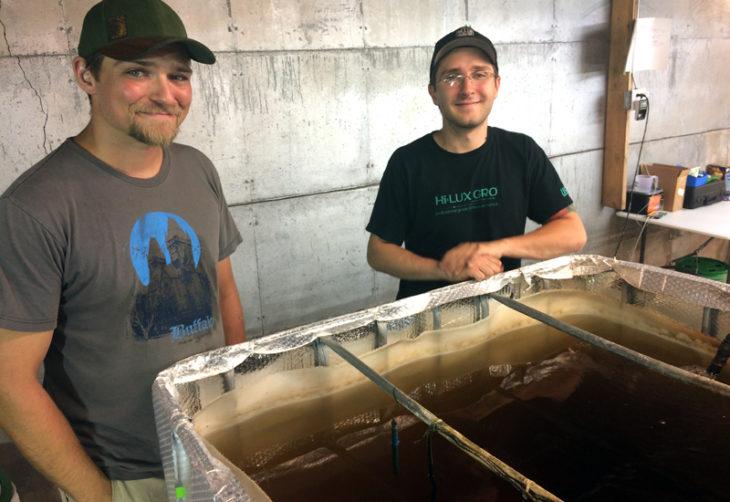
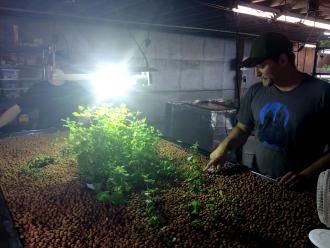
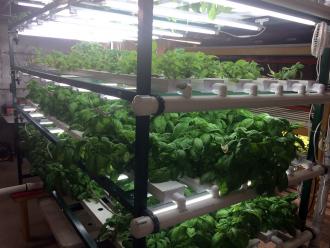
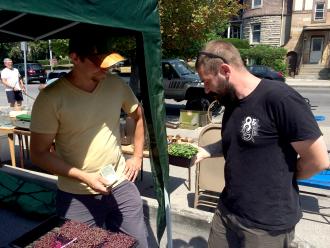
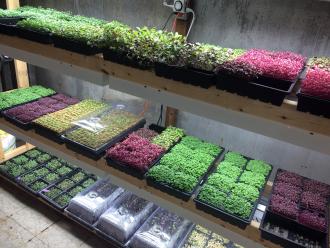
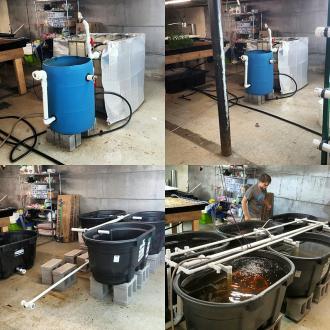
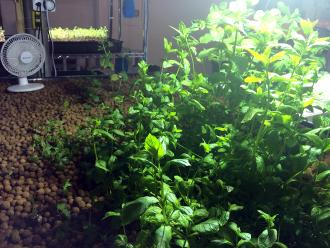
Vertical farming and aquaponics might have gotten out to a slow, grassroots start, but now the growing movement is beginning to pick up the pace. In a world that is driven by mega-food giants such as McDonald’s and Monsanto, there are now glimmers of hope from a new generation of people who are devoting themselves to the sustainable side of the food industry.
Mike Zak (top photo left) and Josh Miller are helping to lead Buffalo towards significant change in an industry that has just about hit rock bottom. Their worker-owner vertical farm and aquaponics business is based on sustainability and cooperative ethics. That means that everyone that helps to grow the operation reaps the benefits. And the benefits are vast, especially if you’re into living a sustainable lifestyle.
Mike and Josh are currently the two sole worker-owners of GroOperative, a business that specializes in aquaponics and vertical gardening. Their operation is located in the basement of Buffalo Roots Hydroponics (BRH), 3231 Main Street. Coincidentally, the two met at BRH, and immediately recognized that they shared a belief that building a sustainable cooperative vertical farming center was not only possible, it was the future of the industry. The owner of BRH, Chris Maloney, also liked the idea, and offered to set the two up in the building. Now Josh works at BRH during the day, and at GroOperative at night. When Mike is not at GroOperative, he’s a teacher at YouthBuild WNY – a construction trades and job skills center on the East Side.
Currently, GroOperative is growing quicker than Mike and Josh can handle. Between Ashker’s and The Lexington Co-op, the vertical farm operation is working overtime growing and selling basil, microgreens, mint, cilantro, etc. Then there are the restaurants that are placing orders – Martin Cooks, Black Sheep, Tempo, SeaBar and Providence Social. GroOperative has even caught the attention of another cooperative – Urban Roots Garden Center, which is now placing orders.
I asked Mike and Josh what they felt they excelled at, in an industry that is just now starting to see some real growth and competition. They said that early on they realized that selling flats of live plants (microgreens) in soil was the way to go. They felt that by cutting their harvest, they were not delivering the freshest goods possible. So they began to sell individual containers to chefs, who could then cut the plants as they saw fit. “When the chef cuts his or her own microgreens,” they explained. “They are getting the freshest supply possible. When they run out, we simply replenish the supply . We work with the chefs, to find out what we should be growing seasonally, and we even devote a portion of our square footage to custom growing. For example, we’re growing a specialized mint for Lockhouse Vodka at the moment.”
Taking a look around the GroOperative space, I noticed that the entire system was designed mimic a living ecosystem. Each aspect of the plant’s live is taken into consideration, to ensure that the right nutrients are in place, and the least amount of resources are expended. There is a fish tank system where Mike and Josh raise catfish, koi and gold fish. The water from the fish tanks, along with compost from their own properties (grass clippings for example), is used to make a nutrient rich tea. The tea is then used to water/feeds the plants. The plants filter the water, which is then recirculated back into the tanks.
Along the way, Mike and Josh have figured out fascinating and effective ways to maintain a thriving ecosystem that is perfect for growing conditions. They use plecostomus (plecos) to regulate the algae and tiny living Gammarus shrimp to clean the solid fish waste which are then fed to the fish. There are tons of beneficial microbes that help the plants in the same way yogurt helps humans.
They also breed predatory nematodes to attack harmful insects. The science behind their success turns out to be what you can’t see, rather than what you can see. Even the growing beds have electric fans trained on them, to simulate wind. And using a Nutrient Film Technique (NFT) – water streams along seedling roots – allows Mike and Josh to produce the biggest yield possible. As the microgreens grow, they become stronger and healthier due to the simulated natural environment – wind, rain, etc.
Aside from all of the technological and scientific advancements that are underway, Mike and Josh are also heavily committed to the cooperative nature of the enterprise. They feel that the sustainability of the business is as important as the sustainability of their products. Moving forward, each of the worker-owners will possess specific skills that will allow the operation to thrive. Right now they are looking for worker/owners who have knowledge/background in marketing and/or large scale aquaculture. Their longterm goal is to get into a 50,000 square foot facility in Buffalo, preferably on the city’s East Side. In order to develop a truly sustainable, long-term business model, Mike and Josh are hoping to connect with a hospital or a university, to draw upon larger fulfillment contracts.
Their longterm goal is to get into a 50,000 square foot facility in Buffalo, preferably on the city’s East Side.
As their business grows, Mike and Josh want to establish educational programming initiatives, where they can teach valuable life skills to those who are currently underserved in the community. They feel that all aspects of their business must be beneficial to the community, whether that means leaving behind a zero carbon footprint, or growing fresh, organic produce year round. Currently they are developing strategic partners locally, to procure additional compost from businesses such as Community Beer Works (spent grains), Farmer Pirates and People United for Sustainable Housing.
I’m a big fan of this sort of progressive vision. I believe that it is not only important for the future of Buffalo, but also for the world. Here we have two guys who have set out to make a sustainable mark on the local food industry. At the same time, they are taking it a step further, by creating a cooperative work environment that has proven to be successful in numerous other fields and industries (from banking to living).
The cooperative motto is ‘Stronger Together’.
“Co-ops have been around for hundreds of years,” Mike told me. “Our goal is to contribute to that part of the economy. We would like to see worker co-ops grow to 30 percent of the economy – that might seem like a long stretch, but we’re aiming high. I have a lot of friends who lived at Nickel City Cooperative housing, and I’m on the board of the Buffalo Cooperative Federal Credit Union. The US is behind the times on all of this, but people want to see it happen. The cooperative motto is ‘Stronger Together’. Our goal is to link together the workers, vendors and consumers. Our society is so programmed that people don’t stop to think about what is best for them – a co-op lifestyle can change the way people live.”
by queenseyes June 27, 2016, 5:51 pm
Buffalo Rising http://bit.ly/2a5SjTh







